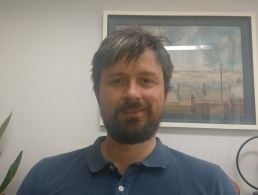Ketan Bhatt discusses the work he does and the skills he uses on a daily basis. He also shares some top productivity tips for tech workers.
Software company Intercom is known for its communications platform that helps companies with customer relationships.
Although headquartered in San Francisco, the company was founded by a group of Irishmen, including recent Future Human speaker Des Traynor, and has made significant investments in Ireland. In December 2021, the company announced plans to nearly double its employees in Dublin by the end of this year.
Most of the new jobs will be in R&D, including engineering, product design and management, research, analytics and data science.
To get more of an insight into what working at Intercom is like, SiliconRepublic.com heard from senior product engineer Ketan Bhatt. He works in the core technologies group, having moved from India to Ireland more than two years ago.
‘My pro tip is that a simple diagram can do wonders!’
– KETAN BHATT
If there is such a thing, can you describe a typical day in the job?
I typically start my day around 9:30am. That gives me 15 minutes before my team’s stand-up to catch up on what I had planned for myself earlier, and Slack messages (I don’t usually get many work emails). I usually take out one hour for lunch at 1pm.
I work in the core technologies team at Intercom, so my typical day will be different from someone working in a classic product team. Other than a daily stand-up, planning and retrospective meetings on Friday and a few one-to-ones, I don’t have many other regular meetings. I really look forward to our team’s meetings though as they are a good way to see each other, learn about what everyone else is working on, and share thoughts and updates about each other’s lives in general.
My typical day usually consists of some time spent pairing with other engineers, either helping them in areas I have more experience in or learning from their expertise. I am also able to get blocks of focus time to work on my priority tasks.
This focus time is spent depending on what stage of problem solving I am in. I could be researching possible directions, brainstorming ideas, writing a tech plan or writing code to spike on a possible solution or implementing a long-term solution.
I follow a shutdown ritual, described in Cal Newport’s book Deep Work. So, at the end of my working day, around 5:30pm or 6pm, I go through what I did today, save context from work still in progress and plan for the next day. This lets me switch off from my ‘work self’ and I start my next day with better clarity.
What types of project do you work on?
During my first year at Intercom, I worked with the billing team. I enjoy reading and learning about system design, so billing was an interesting space. It gave me the opportunity to work closely with our sales team and tackle some fascinating problems.
My current team, the core technologies team, is highly autonomous. Our mission is to accelerate Intercom’s growth and stability through educated and operationally excellent core technology usage.
The team consists of experienced engineers who each own a particular technology that Intercom uses. Some people are experts at MySQL, some with Rails etc.
I serve as an Elasticsearch expert for Intercom. One of the projects I recently finished was evolving the ability to scale our use of Elasticsearch to keep up with Intercom’s growth.
What skills do you use on a daily basis?
Outside of my technical skills, communication is one of the core parts of a software engineering job. Every day I am either collaborating directly with folks from different teams and functions, writing a proposal about why we should be solving a particular problem or writing a tech plan to communicate how to solve that problem.
My pro tip is that a simple diagram can do wonders! I am lucky to have a lot of skilled colleagues to mentor me in this area.
Another skill that I am working on is to look at a problem from the right ‘zoom level’. It is very easy to keep executing when you are deep in the trenches of solving a problem, but it’s helpful to step back regularly and reassess where you are going. My friend Kesha Mykhailov calls it “surfacing to take a breath as you swim”.
What are the hardest parts of your working day?
I realise what I am going to say will sound like the classic, “Tell me your biggest weakness – I am a perfectionist” response. But, for me, keeping up with the level of impact my teammates are having is a constant struggle.
I am fortunate to be surrounded by people who are experts in their respective fields and have spent many years in the trade, but it is difficult to not compare yourself with them and feel dejected.
I have become better at leaving comparison behind with the help of Ryan Sherlock, my manager, and those same teammates who helpfully point at the impact I am having, and that I am still just starting out.
When I feel stressed about it, I have a chat with Ryan and recalibrate. We become our worst critics and it is good to remember that we are doing good enough. If we were not, we wouldn’t be where we are today.
Do you have any productivity tips that help you through the day?
If you are serious about increasing your productivity, I suggest you read Deep Work, which I mentioned earlier. I use Cal Newport’s advice for a shutdown and start-up ritual, and scheduling your day. I also don’t have Slack on my phone, so that helps me disconnect when I call it a day. And I can’t work without a to-do list.
A solid piece of advice that I always adhere to is investing time into learning skills when you can afford to be a little slow. Once you get better at it, you will be faster during a crisis. For me, developing these skills has helped me to work with my coding environment faster by learning more keyboard shortcuts and getting better at command line tools.
I’ll end with a technical productivity tip. I learned to use the library jq, which lets me process JSON quickly on the command line. I work with technologies that output data in JSON frequently (AWS APIs, Elasticsearch query results, etc) and jq helps me run simple analysis really quickly.
How has this role changed as this sector has grown and evolved?
Delivering an excellent customer experience is a must for all internet businesses and our industry is evolving to meet that need. At Intercom, we believe that primary platforms will manage all customer communications and in-context, company-owned messaging will be the future primary channel for customer communication.
That means my role and ensuring that the Intercom platform can scale to serve the needs of all customers (no matter their size or industry) is more important than ever. Businesses want next-generation technologies and user experience, and I have the exciting opportunity to play a role in building that future of software.
10 things you need to know direct to your inbox every weekday. Sign up for the Daily Brief, Silicon Republic’s digest of essential sci-tech news.




